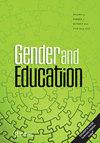对话自我视角下的学术界性别不平等:超越“自主男性”和“关系女性”
IF 1.9
3区 教育学
Q2 EDUCATION & EDUCATIONAL RESEARCH
引用次数: 0
摘要
“自主男性”和“关系女性”的二分法是一个长期存在的社会结构,通常被认为是一个事实。它还建议与学术界性别不平等的再现有关。通过对话自我理论的视角,基于我们的叙事数据,我们表明微妙的性别不平等导致了自我对话结构的紧张。这种张力是由物质和结构障碍所造成的,并植根于相互竞争的自我叙述的多样性。这种紧张并不是缺乏能动性的表现,而是与自我、组织和社会之间的相互作用有关。那些关键职位之间具有较高程度的多样性和民主关系的人更容易因为相互竞争的自我叙述而在职业发展中面临紧张。在这种情况下,我们引入了“自治”和“减少多样性”之间的区别。这种区别将焦点从女性转移到自我,转移到男性和减少i -position的多样性,以解决性别不平等问题。本文章由计算机程序翻译,如有差异,请以英文原文为准。
Gender inequality in academia from the perspective of the dialogical self: beyond ‘autonomous men’ and ‘relational women’
ABSTRACT The dichotomy of ‘autonomous men’ and ‘relational women’ is a long-lived social construction that is often taken for a fact. It is also suggested to relate to the reproduction of gender inequality in academia. Through the lens of dialogical self-theory, and based on our narrative data, we show that subtle gender inequality causes tension in the dialogical structure of the self. The tension is enforced by material and structural barriers and is rooted in the multiplicity of competing self-narratives. This tension is not an indication of lack of agency, and is linked to the interplay between self, organization and society. Those with a higher degree of multiplicity and democratic relations among their key I-positions are more prone to facing tension in career progression because of competing self-narratives. In this context, we introduce a distinction between ‘being autonomous’ and ‘having reduced multiplicity’. This distinction shifts the focus from women only to selfhood, and to men and the reduction of multiplicity of I-positions to address gender inequality.
求助全文
通过发布文献求助,成功后即可免费获取论文全文。
去求助
来源期刊

Gender and Education
EDUCATION & EDUCATIONAL RESEARCH-
CiteScore
5.20
自引率
9.10%
发文量
31
期刊介绍:
Gender and Education grew out of feminist politics and a social justice agenda and is committed to developing multi-disciplinary and critical discussions of gender and education. The journal is particularly interested in the place of gender in relation to other key differences and seeks to further feminist knowledge, philosophies, theory, action and debate. The Editors are actively committed to making the journal an interactive platform that includes global perspectives on education, gender and culture. Submissions to the journal should examine and theorize the interrelated experiences of gendered subjects including women, girls, men, boys, and gender-diverse individuals. Papers should consider how gender shapes and is shaped by other social, cultural, discursive, affective and material dimensions of difference. Gender and Education expects articles to engage in feminist debate, to draw upon a range of theoretical frameworks and to go beyond simple descriptions. Education is interpreted in a broad sense to cover both formal and informal aspects, including pre-school, primary, and secondary education; families and youth cultures inside and outside schools; adult, community, further and higher education; vocational education and training; media education; and parental education.
 求助内容:
求助内容: 应助结果提醒方式:
应助结果提醒方式:


